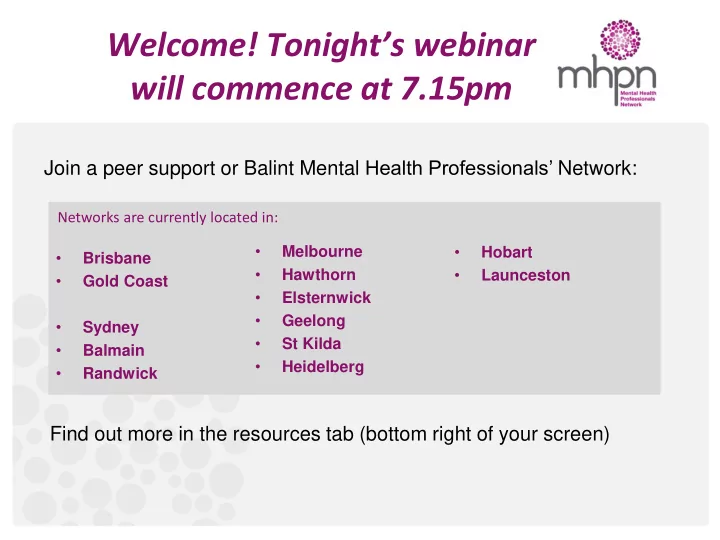

Welcome! Tonight’s webinar will commence at 7.15pm Join a peer support or Balint Mental Health Professionals’ Network: Networks are currently located in: • • Melbourne Hobart • Brisbane • • Hawthorn Launceston • Gold Coast • Elsternwick • Geelong • Sydney • St Kilda • Balmain • Heidelberg • Randwick Find out more in the resources tab (bottom right of your screen)
Webinar DATE: Self-care for mental health professionals November 12, 2008 Thursday, 23 rd August 2018 Supported by The Royal Australian College of General Practitioners, the Australian Psychological Society, the Australian College of Mental Health Nurses and The Royal Australian and New Zealand College of Psychiatrists
PAGE 3 Tonight’s panel Professor Simon Willcock Katherine Fairest Ann Evans General Practitioner Mental Health Nurse Psychologist Audience tip: Click the ‘Open Chat’ tab at the bottom right of your screen to chat with other participants. Associate Professor Louise Nash Facilitator: Dr Catherine Boland NB: chat will open in a new Psychiatrist Clinical Psychologist browser window.
PAGE 4 Ground rules To ensure everyone has the opportunity to gain the most from this live event please: • Be respectful of other participants and panellists: behave as you would in a face-to-face activity. • Interact with each other via the chat box . As a courtesy to other participants and the panel, please keep your comments on topic. Please note that if you post your technical issues in the participant chat box you may not be responded to. • Need help? Click the technical support FAQ tab at the top of your screen. If you still require support, call the Redback Help Desk on 1800 291 863. • If there is a significant issue affecting all participants, you will be alerted via an announcement. Audio issues? Listen on your phone by dialling this phone number 1800 896 323 Passcode: 1264725328#
PAGE 5 Learning outcomes Through an exploration of self-care this webinar will provide you the opportunity to: • Identify challenges, tips and strategies for self-care to reduce stress and maintain well-being • Describe the importance of regular self-care when working in a mental health environment • Identify key components of a self-care plan and ways to avoid a crisis Supporting resources are in the library tab at the bottom right of your screen.
PAGE 6 Caroline’s story: a summary • Caroline is a clinical psychologist and university lecturer • Mother of two children, aged six and three • In current practice for 10 years (three days week) and two days university work • Five years ago practice hired practice manager – insists on eight clients a day • Workload heavy but perseveres, clients with personality disorder and PTSD • Partner Nick had serious car accident and undergoing rehabilitation • Nick has many appointments, reduced work and income, less help with children
PAGE 7 Caroline’s story: continued • Supplementing income with additional university work • Exhausted, not sleeping well, making mistakes, feeling stressed and reluctant to confide in colleagues • Colleague Maria asks Caroline if she is OK. Maria suggests Caroline see her supervisor but Caroline responds that ‘she doesn’t have time’ • Caroline is intending to see GP for sleeping medication for relief
PAGE 8 Q&A Professor Simon Willcock Katherine Fairest Ann Evans General Practitioner Mental Health Nurse Psychologist Associate Professor Louise Nash Facilitator: Dr Catherine Boland Psychiatrist Clinical Psychologist
PAGE 9 Upcoming webinars Engaging with parents and infants in the first thousand days (Emerging Minds webinar series) Monday 17 September 7:15pm AEST --- Management of self-injury and suicidality (BPD webinar series) Monday 26 September 7:15pm AEST Register now Your Feedback is important – open the ‘Feedback Survey’ by clicking on the tab at the bottom of your screen
PAGE 10 Practitioner support groups Practitioner self-care is an important aspect of working in mental health. MHPN supports balint and peer support groups where practitioners from a range of disciplines meet and confidentially present cases in a respectful, supportive and non-judgemental environment. Download the networks flyer from the resources tab (below) to learn more.
PAGE 11 Thank you! • Please complete the survey feedback before you go. Click the survey feedback tab at the top of your screen to open the survey. • You will be emailed a Certificate of Attendance for this webinar within four weeks. • All participants will be emailed a link to the online resources associated with this webinar within two weeks. Your Feedback is important – open the ‘Feedback Survey’ by clicking on the tab at the bottom of your screen
PAGE 12 Thank you for your contribution and participation Good evening Audience tip: Your feedback is important to us – please click the ‘Feedback Survey’ tab to open the survey
Recommend
More recommend